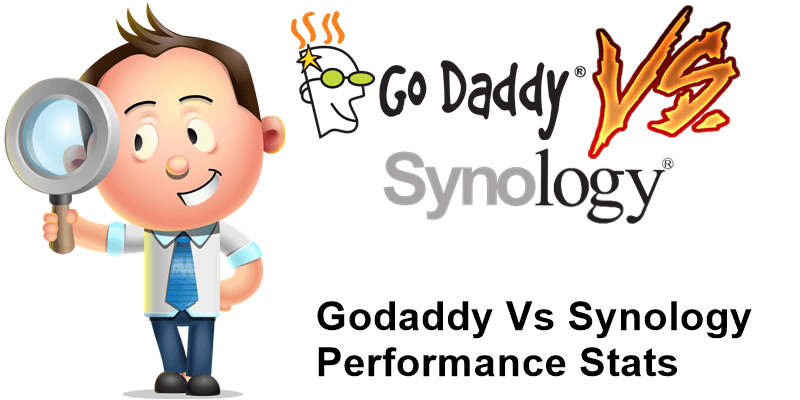
Is it better to buy a website hosting plan on GoDaddy or host your own website directly from home on a Synology NAS? After lots of tests I arrived at the conclusion that hosting from home on a Synology NAS is extremely convenient from a financial point of view first and foremost, and offers other awesome long-term benefits at the same time.
Let’s compare a mid-high end Business Expand hosting plan on GoDaddy against hosting on a DS718+ Synology NAS.
GoDaddy hosting plan: stats
GoDaddy Hardware: 8 GB RAM – 150 GB HDD (unknown vendor) – 4 Core CPU (unknown vendor) – Standard SSL Certificate – Unmetered traffic (But they can limit your resources, and will at one point.)
GoDaddy hosting plan price: 99.99 dollars per month which, multiplied by 12 months, adds up to a total of 1,199.88 dollars a year.
HTTP/2 support: NO.
SSD support: NO.
Free SSL Certificate: YES.
Linux Server: YES.
Dedicated IP: YES.
Price: 1,199.88 / year without VAT.
Synology NAS as a web hosting server: stats
Synology DS718+: 8 GB RAM – 250 GB Crucial MX500 SSD disks – 4 Core CPU – Free SSL Certificate from Let’s Encrypt – Unmetered Traffic and data transfer via fiber connection.
Synology DS718+ price: 420 dollars for the box + two SSD disks at 50 dollars each + 8GB RAM expansion. Total price: 700 dollars (one-time payment). 200 dollars if you add an UPS for 100% uptime. Total cost: 900 dollars, one-time payment.
HTTP/2 support: YES.
SSD support: YES.
Free SSL Certificate: YES.
Linux Server: YES.
Dedicated IP: YES.
Price: 900 / forever.
It’s easy to see the difference between the two options and realize that web hosting on a Synology NAS comes with lower costs than a decent hosting plan on GoDaddy, especially long-term. Synology offers all the packages needed to start and maintain a website, and makes updates to the packages on a regular basis to keep up with the latest in security. Because it’s a Linux heart inside the box, choosing Synology means choosing security and stability, not to mention you enjoy benefits such as privacy and complete control over your data as you are the only one with access to your files.
What about power consumption? Synology DS718+ power consumption is 20 Watts. You will pay a maximum of 20 dollars a year in electrical bills for the NAS only, but costs may differ slightly depending on which country you live in.
What about power failure? In my case, I’ve added an awesome product to my home web hosting setup and that is an UPS. A CyberPower UPS to be more exact. Adding an UPS to your Synology setup means you won’t experience power failures and will enjoy an uptime score that easily competes with that of top hosting services; by doing this, you will also be extending the life of your Synology NAS box.
Winner: Synology DS718+
Note: Read my article: Pay For Web Hosting vs Hosting on My Synology NAS.
This post was updated on Monday / August 30th, 2021 at 11:58 PM
